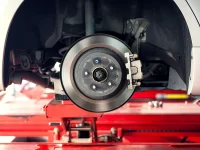RV Storage - What to Do with Your RV in the Off-Season

Recreational Vehicles (RVs) are a fantastic way to explore the country, providing the comfort of a home on wheels. However, there comes a time when every RV owner needs to park their vehicle for an extended period. Proper RV storage is essential for maintaining the vehicle’s condition and prolonging its lifespan. This article aims to provide an ultimate guide to RV storage, focusing on its importance, types, and how to find the ideal storage near you. Owning an RV is akin to having a mobile vacation home. It’s a significant investment, and like any other significant investment, you need to protect and maintain it.
The off-seasons, when you’re not using your RV, present a particular challenge. Leaving your RV exposed to the elements or parked in your driveway is not the best solution. Investing in RV storage doesn’t merely mean finding a place to park your vehicle. It’s about ensuring that the storage facility provides the necessary protection and maintenance to keep your RV in tip-top condition. As an RV owner, understanding the various aspects of RV storage is crucial. Let’s delve deeper into this topic. We spoke with the people at RVSpace4Rent.com and discussed how to start an RV storage business to get some insights on what RV owners do in the off-season.
Proper RV Storage
When it comes to RV storage, many owners underestimate its importance. You may think that parking your RV in your driveway or backyard is enough, but this is far from the truth. Proper RV storage is crucial for several reasons. The primary one being, it helps protect your RV from the harsh elements. Exposure to harsh weather conditions such as extreme heat, cold, rain, or snow can cause significant damage to your RV. This could range from paint peeling off, rusting, and even interior damage. Proper RV storage provides a controlled environment for your vehicle, protecting it from these harmful elements. In addition to protecting your RV from the elements, proper storage also helps deter theft and vandalism. An RV parked in a driveway or on a street is an easy target for thieves. On the other hand, a well-secured RV storage facility offers enhanced security measures to safeguard your vehicle.
Types of RV Storage: Indoor, Covered, and Outdoor
There are primarily three types of RV storage – indoor, covered, and outdoor. Each type offers different levels of protection and comes with its own set of advantages and drawbacks. The choice of storage type will largely depend on your budget, the size of your RV, and the level of protection you desire. Indoor RV storage offers the highest level of protection. It involves storing your RV in an enclosed space, protecting it from elements like rain, snow, and UV rays. This type of storage also offers additional security features such as surveillance cameras and alarm systems. However, indoor RV storage is the most expensive option. Covered RV storage is a middle-ground option. It offers some protection from the elements, but not as much as indoor storage. Your RV is stored under a roof, protecting it from direct sunlight and precipitation. However, the sides are usually open, thus offering limited protection. Lastly, outdoor RV storage is the cheapest option. It involves parking your RV in an open space within the storage facility. While this type of storage offers the least protection from the elements, it’s an affordable option for those on a budget.
How to Find RV Storage
Finding the right rv storage can be a challenge, especially with numerous options available. However, with a little bit of research and due diligence, you can find the perfect facility to store your RV during the off-season. Start by conducting an online search for RV storage facilities in your area. Look for facilities that offer the type of storage you prefer – indoor, covered, or outdoor. Consider the size of your RV as well – not all facilities can accommodate larger models. Visit the facilities in person before making a decision. This will give you a chance to inspect the storage spaces, assess the security measures, and meet the staff.
The Benefits of Indoor RV
If you’re looking for the highest level of protection for your RV, consider indoor RV storage. Indoor RV storage offers several benefits that make it worth the investment. The primary benefit of indoor RV storage is the protection it offers from the elements. Your RV is stored in an enclosed space, shielding it from rain, snow, and harmful UV rays. This helps prevent exterior damage such as fading, cracking, and rusting. Indoor storage also offers enhanced security. With features such as surveillance cameras, alarm systems, and restricted access, you can rest assured that your RV is safe from theft and vandalism. Lastly, some indoor RV storage facilities offer additional services such as regular cleaning, maintenance checks, and even climate control. These services can help keep your RV in excellent condition during the off-season.
What to Look for in an RV Storage Facility
When choosing an RV storage facility, there are several factors to consider. The most important factor is security. Ensure that the facility has adequate security measures in place, such as surveillance cameras, secure fencing, and controlled access. The size and type of storage spaces available is another crucial factor. The facility should be able to accommodate your RV’s size and offer the type of storage you prefer – indoor, covered, or outdoor. Additional services offered by the facility can also influence your decision. Some facilities offer services such as cleaning, maintenance checks, and even pick-up and drop-off services. These additional services can add convenience and ensure your RV stays in top condition during the storage period.
Preparing Your RV for Storage
Before you store your RV, it’s essential to prepare it properly. This process involves several steps, including cleaning, inspecting, and protecting various components of your RV. Start by giving your RV a thorough cleaning, both inside and out. Remove all food and perishable items to prevent pests. Drain all the tanks and winterize the plumbing system to prevent freezing damage if you’re storing your RV during winter. Inspect your RV for any existing damage. Fix any issues before storing your RV. Cover your RV, especially if you’re opting for outdoor or covered storage, to protect it from dust and other elements.
Maximizing Your RV’s Longevity with Proper Storage Practices
Proper storage practices play a crucial role in maximizing your RV’s longevity. By storing your RV in a secure and suitable environment, you can protect it from damage and maintain its condition. Regular maintenance is also key to prolonging your RV’s lifespan. Even during storage, your RV needs regular checks and upkeep. Some storage facilities offer maintenance services, ensuring that your RV is ready to hit the road at any time. Proper preparation before storage is also essential. This includes cleaning your RV, fixing any existing damage, and protecting various components of your RV.
The Cost of RV Storage: Is it Worth it? The cost of RV storage can vary significantly depending on the type of storage, the size of your RV, and the location of the storage facility. While it may seem like an additional expense, the benefits of RV storage make it worth the investment. Storing your RV in a secure and controlled environment protects it from damage, thereby saving you repair and replacement costs in the long run. It also helps maintain your RV’s value, which can be beneficial if you decide to sell it in the future. Moreover, storage facilities that offer additional services such as cleaning and maintenance can add convenience and save you time and effort.
Safeguarding Your RV for Off-Seasons
Proper RV storage is an essential aspect of RV ownership. It provides a safe and secure environment for your RV during off-seasons, protecting it from the elements, theft, and vandalism. Whether you choose indoor, covered, or outdoor storage, the key is to find a reliable rv storage that meets your needs and budget. Remember, the longevity and condition of your RV largely depend on how you store and maintain it. By investing in proper RV storage and implementing suitable storage practices, you can maximize your RV’s lifespan and enjoy many more adventurous journeys.







